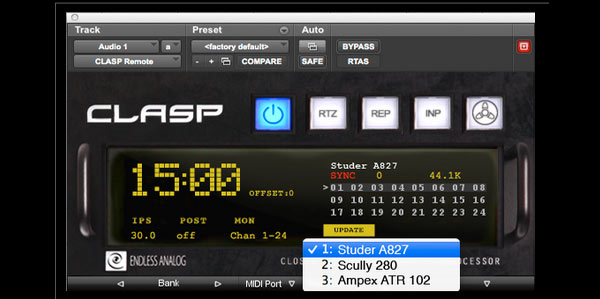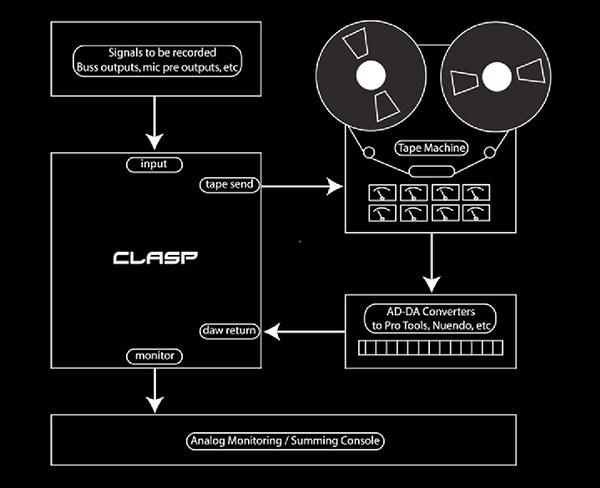CLASP: Everything Old Is New Again?
The CLASP (Closed Loop Analog Signal Processor) system I described yesterday is another studio tool that audio engineers can use to record create a very specific “tonal flavor” for an album. They describe it as putting back “the sound of what’s been missing” on their website. That characterization or “marketing spin” as I prefer to call it is not exactly accurate. It would more appropriate to say CLASP or analog recording puts “reduces the fidelity in a pleasing way”…kind of like vinyl LPs.
Figure 1 – The CLASP system signal flow.
The CLASP system is a very useful tool for those that want the “positive” things that analog tape recording does to the sound of a recording. If the sound that recording engineers and producers achieved in the days when the only choice we had was to work with analog multitrack machines is the sound that an artist or producer wants today, then CLASP is one way to get there. But it’s not the only way.
T. Bone Burnett is a very well know producer and loves the sound of analog tape. Virtually all of the projects that he’s produced over the past few years have been done on actual analog tape machines using reel-to-reel tape (each reel of 2″ tape goes for more than $300 each). The machines have to be cleaned, demag’d, and calibrated everyday prior to the sessions and they wear out. The oxide gradually gets scrapped away along with all of the high frequencies. There is a market for studios that still maintain analog tape machines…but it is a specialty offering.
Another way is to use a plug-in to emulate the kinds of things that a pass through an analog tape machine does…except you do it with a digital process inside of your workstation. These kinds of plug-ins (along with all of the other ones that emulate older vintage gear) have gotten very good and are virtually indistinguishable from the real thing. And the best part is that they can be turned off and on! The “compromised sound” that you’re actually recording with CLASP is not permanent using plug-ins.
Wouldn’t it have been better if Mark Knopfler had decided to use the “analog tape” plug-in instead of actually doing a “destructive” process on his new album. If he had, then we’d be able to enjoy his production in real high-resolution. But that “warmth and air” that the former CEO of Sony Music describes in his testimonial video is all important to many legacy artists…and the younger ones that are nostalgic for the good old days.
In my perfect world, any of these “sound enhancement processes” can be applied at the delivery end of the music reproduction chain. Like heavy mastering of dynamics to get that punchy “radio/CD” sound, adding analog tape attributes like hiss and distortion, speed variations, scrape flutter, print through, etc could be applied at your music server or smartphone…for those that want that sort of thing. I can tolerate it when I’m listening to oldies, but not for new recordings.
Having dedicated myself to producing and releasing the cleanest, most accurate sounding, pure music recordings, I’m surprised that prominent engineers and producers believe that “everything old is new again”. CLASP is merely another tool to be used as necessary. It works but requires the use of an analog tape machine and I’m simply not interested in getting back into that sort of hardware.



So much of what we kick around has semantic issues built in. When folks go from MP-3 to vinyl, it is very clear to me that they are relieved to get away from the noxious, welded-in distortions of lo-fi digital, and to be presented with a much more innocuous, easier to live with family of distortions.
I do find the CLASP system to be kind of hilarious. It is also true however that many of the best-sounding CD’s are analog recordings digitally transferred and mastered, so there is evidently an issue of complementary sonic qualities that these engineers are seeking. I’d call it the pursuit of inoffensive,analog distortions while preserving the SN and archival qualities of digital. Pretty soon they’ll be adding the sound of crackling LP’s too.
I particularly enjoyed the little work Knopler did with Chet Atkins. I always felt early on that Chet’s sound was ahead of most. Nashville recordings by and large seemed to benefit from a well treated clean sounding studio. Was Chet doing something special or just being careful, who knows ?
As for the Hi Rez, we have VanHalen out today with yet another example of “remastering” offers. With aging artists, unwittingly or unwillingly going this route for the take, can there be any short term hope for ANY better format ? It’s been 35 plus years of “CD”, will it be another 20 or more of “CD” rei-invention. Can’t one make the case that DSD folks see their flawed case as something dear to the “storage” gods ? Let’s all just listen and do the “hokey-pokey”.
“Having dedicated myself to producing and releasing the cleanest, most accurate sounding, pure music recordings, I’m surprised that prominent engineers and producers believe that “everything old is new again”. ”
Very glad to hear you taking that position Mark. Since the very earliest days of audio recording the goal for future progress has been to get ever closer to reproduction of the live event, to be able to have equipment that could reproduce exactly what the microphones heard in the studio or concert hall. Seems like in recent years everyone in the recording chain has been looking to add some type of distortion to the recording that pleases someone, but takes us ever farther from the intended goal.
We have such wonderful tools at our disposal today that have the possibility of delivering a playback that might set us on our behinds. Lets get back to the ideals of the direct to disc recordings of the 80 and 90s. Position the mics in front of the performers in as best a positions as possible, get rid of as much of everything in the middle as possible, and feed the least manipulated signal as possible into your digital recorder. Throw as much of your console and ProTools aside as you can. They can distort the pure mic signal but never improve it.
The best recordings I’ve ever heard were done by engineers who took the purist approach even though they were using electronics of very dated design. A David Manley purist approach using today’s HDA tools could set the industry back to pursuing the true path to High Fidelity. Take a few moments to read the sonic path of David Manleys minimalist recording approach.
http://www.positive-feedback.com/Issue65/manley_recordings.htm
If we are going back to the “original: sound we need to get rid of the vocal doubling (or tripling) on that Knopfler recording. VERY distracting, IMHO. Just ’cause you have lots of tracks available doesn’t mean you have to use them all.
This has been a common production technique for a very long time…the Beatles did it in the early 60s and Mary Ford did it with Les Paul in the 50s.
Mark said:
>> In my perfect world, any of these “sound enhancement processes” can be applied at the delivery end of the music reproduction chain.
Delivery end?? As in under my control or choosing or at the final production stage??? I so wish there were more consumer side options so I could hear many different attributes of the recording, much more that the two channel static stylized sonically diluted presentation that the investor, profiteers, and spin master spew in our direction.
I wish I had the option, as a consumer, for many choices of surround mixes to focus on what I want hear or, better yet, explore to find something I didn’t catch before. There are so many interesting sounds that go into a production that we can barely heard in a 2 channel, average fidelity presentation. What a shame! Some performing artists or mixing genius added some subtle and wonderful nuance that almost no one can detect or appreciate.
I guess I want Mark’s multiple sound stage presentation on steroids!
I’ve been told I missed my calling and should have been a recording engineer I guess that’s what I need to do as a 61 year old person (shure.. Humm, always misspell that 4 letter word for some reason ) to get what I desperately want to hear because it’s not coming through the consumer pipeline for a few more decades.
Mark, in the world of virtual media, do you ever think of making more options available than the alternate sound stages? Can you create a new market for such a thing?????
I would love to give you control,but I was actually thinking that the parameters setup by the mastering house could be used as metadata to affect the audio in realtime during playback.
My heard goes out to the recording engineer. I’ve seen Knopfler in person a number of times and as can be heard on the video here he has a very soft voice and sings at a very low level. Always seemed like the live mixer was struggling to get Mark at a level he could be heard and many times I still could not make out the vocals. Imagine it’s a bit easier in the studio.